
Desktop Tablet Phone
Corona and the fourth wave: A pandemic for the unvaccinated?
This is a balanced overview of where the world is now, with Covid-Delta.
Melinda Crane (27 minutes)
Published by: "To The Point" on DW News - September, 2021
 Video URL: https://youtu.be/_B-0zXsZo-o
Video URL: https://youtu.be/_B-0zXsZo-o
Corona infection rates are on the rise again. But this time it’s mainly the unvaccinated young who are affected. How dangerous will the fourth wave be?
Get a sensible overview of how things are changing, in Europe and elsewhere.
Selected Countries - Death Rates
Listed according to Deaths per/mil of the population in the last 6 months.
Countries listed first have least control of the virus.
Data as of 30 September, 2021
Brazil
Population 213.6 million. Covid-19 deaths 600,000+. Deaths per/mil 2,808
President Jair Bolsonaro has refused to mandate a nationwide lock-down, and opposes local lock-downs, claiming the damage to the economy outweighs the health risks. He believes that herd immunity will eventually protect the population, and that the vaccines are not safe. In June 2021 the daily death toll was 2000. At the end of September the daily death toll is about 500.
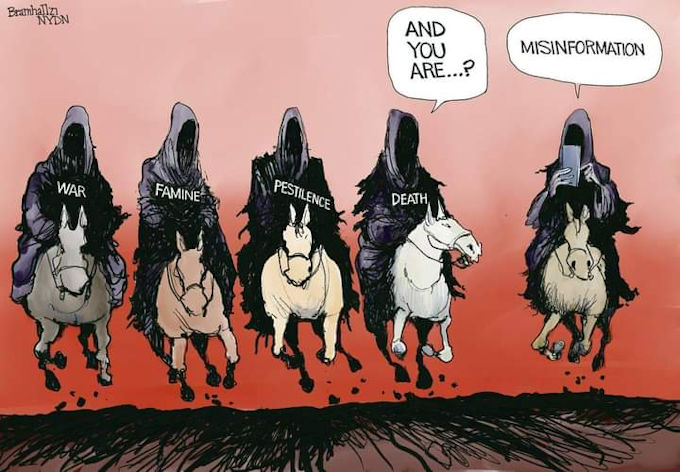
Pfizer tried very hard to offer Brazil vaccines, but the offer was ignored.
Prof. Pedro Hallal claims that there have been 400,000 unnecessary deaths.
President Bolsonaro said, "Staying at home is for idiots." He encouraged the off-label use of drugs for earl treatment of Covid-19 including hydrooxycloroquine, erythromycin, and invermectin.
The system was been overwhelmed. There have been widespread demonstration to remove President Jair Bolsonaro from office. The next election is in 12 months time.
In July, 2021 the BBC reported that, "Everything you should not do, Brazil has done." Since April 2021 there have been debates in the Brazilian Senate, screened on television, about the Covid-19 response.
Russia
Population 146 million. Covid-19 deaths 211,696. Deaths per/mil 1,408
We suspect that the death toll is under-reported. The flare-up of infections over the summer months was blamed on the Delta variant.
On October, 5th Russia reported 25,110 new coronavirus cases and the new daily death record of 895 deaths. Russia's Prime Minister Mikhail Mishustin has warned that the vaccination rate in Russia is insufficient to halt the increasing Covid cases.
Russia’s top cabinet official on Monday criticized the country's stalling vaccination rates for failing to slow the spread of Covid-19 as Russians die in numbers not seen since the start of the pandemic.
Anna Popova, the head of the Rospotrebnadzor health watchdog, which is leading the country’s response to the virus, said the growth in new infections was “intense” in 36 of Russia’s 85 regions. She also warned regional healthcare systems to be prepared for a possible influx in patients over the coming weeks.
Yet despite the country's persistent rise in daily deaths and new cases, Russian officials say there are no plans to impose a lockdown. Moscow briefly tried to require proof of vaccination or a negative PCR test for indoor customers at restaurants and bars, but abandoned the program after business owners complained of reduced revenues.
Russia has produced it's own vaccine, Sputnik V, but there have been production delays. Only 50 million Russians have had their first dose, and just 28% of its 144.4 million population fully vaccinated.
In Moscow, large events and venues including nightclubs are limited to 500 people with everyone required to present a COVID health pass attesting they have either been fully vaccinated, have tested negative over the previous 72 hours or recovered from the disease over the previous six months.
The United States is set to impose new travel rules that would ban entry to non citizens who have not been vaccinated with an FDA or WHO-approved vaccine, a move that would shut out millions who have received Russia's Sputnik V vaccine.
United States of America
Population 213.6 million. Covid-19 deaths 711,222. Deaths per/mil 2,133
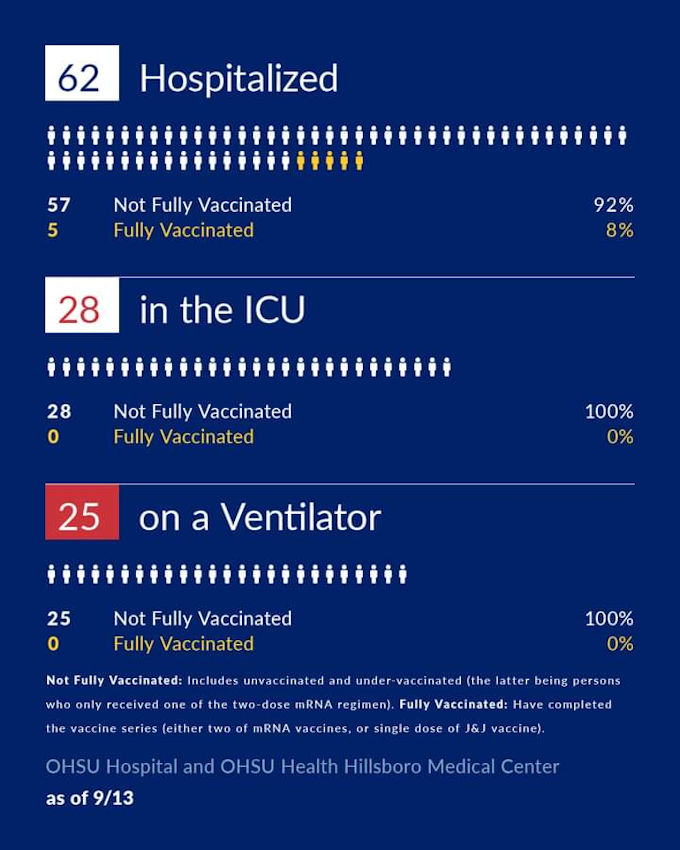 Cases are still rising in 25 States, but overall they are now falling. 2000 death a day at the end of September. But it's very different from state the state, depending on the leadership. Southern States and states that voted Republican through the Rust belt and Alaska have the most infections.
Cases are still rising in 25 States, but overall they are now falling. 2000 death a day at the end of September. But it's very different from state the state, depending on the leadership. Southern States and states that voted Republican through the Rust belt and Alaska have the most infections.
In Alaska the Mayor of Anchorage, since May 2021, Dave Bronson, says that the vaccines are experimental, he will not allow any Covid-19 restrictions on business as normal, and opposes the use of masks indoors. Bronson said, "It is not his place to tell residents to be vaccinated." Meanwhile only 800,000 doses of vaccine have been administered in Alaska (About 50% of the population have had two doses). Daily deaths in Alaska reached an all time high at the end of September, 7 deaths per day. That shows clearly the way in which misinformation kills people.
Alaska Is Rationing Health Care As COVID-19 Cases Soar
(3 minutes)
Published by: TODAY - 6 Oct 2021
 Video URL: https://youtu.be/vUw_KUqSvEQ
Video URL: https://youtu.be/vUw_KUqSvEQ
While the number of new COVID-19 cases is finally coming down nationwide, Alaska is so slammed that some hospitals there have started rationing health care. NBC’s Ellison Barber reports for TODAY from Anchorage.
Across the USA, about 750,000 new shots are given each day. The most vaccinated state is Connecticut at 80%, and the least vaccinated state is Virginia at 48% fully vaccinated.
Italy
Population 60.4 million. Covid-19 deaths 130,807. Deaths per/mil 2,167
Starting on October 15, Italy will demand a Covid Green Certificate (proving vaccination, a recent negative test or recovery) from all 23 million public and privately employed workers. While this is not the same as mandatory vaccination, in practice it is very hard for an employee to be constantly undergoing coronavirus tests just to go to work.

The euphoria of Italy fans seeing their national football team claim the Euro 2020 title could soon be dampened as the effect of social gatherings makes itself felt, Pierpaolo Sileri, the Italian deputy health minister said: “It’s great to see people in the squares, but we will inevitably see the number of infections rise.
“I fear by the end of the month (October) with the Delta variant, there will be three to four times the contagions that we have today,” he warned.
The Covid Green Certificate, the free document in digital and printable format that makes it easier to attend public events in Italy (such as fairs, concerts, sports competitions, and festivities during religious or civil ceremonies), to access nursing homes and to move in and out of areas that may be classified as 'red zone' or 'orange zone', is now available in Italy. The certificate, features a QR Code verifying its authenticity and validity.
France
Population 64.5 million. Covid-19 deaths 116,615. Deaths per/mil 1,782
France has already made the COVID-19 Health Pass mandatory for all persons who wish to attend certain places and activities, meaning that access to restaurants, shops, and other spaces is limited only to those who hold one of the COVID-19 certificates.
In France, essential workers who deal with the public, must get vaccinated or face getting suspended. The more contagious Delta variant of the virus sent the infection rate spiking up again to nearly 24,000 by mid-August.
The rule applies to all doctors, nurses, office staff and volunteers. About 3,000 health workers in France have already been suspended because they have not been vaccinated against Covid-19, but it's expected that "most of the suspensions are only temporary".
Spain
Population 46.8 million. Covid-19 deaths 86,358. Deaths per/mil 1,846
75% of the population is now immunized – there is an ongoing debate on whether to make inoculations mandatory, at least for certain professions.
“Everyone should be forced to get vaccinated even if they don't want to.” Fully 47.7% of Spaniards checked this answer in a survey about Covid-19 immunization. Another 25.4% said that “nobody should be forced to get vaccinated” while 21.8% said it depends on each case, and 4.8% were undecided.
Spain has become a leader of Europe's virus vaccination drive
(4 minutes)
Published by: DW News - 13 August 2021
 Video URL: https://youtu.be/4Ih6Fi5j9Sg
Video URL: https://youtu.be/4Ih6Fi5j9Sg
Vaccination fatigue and anti-vaxxer movements - such factors are behind the lagging vaccination programmes in countries like Germany and France. Some governments are introducing incentives, others are making it compulsory to get vaccinated. Not so in Spain. After a slow start the country has embarked on a smooth inoculation campaign - eased by a generally pro-vaccination attitude.
These percentages rise considerably for certain professions: 81.5% of respondents said that healthcare personnel, senior home staff and workers who deal directly with the general public should all get mandatory shots.
In Spain, where the coronavirus incidence has dropped to 96 per 100,000 people – the first time since June 25 that it falls below 100 – health authorities reported 4,075 new coronavirus cases and added 101 fatalities to the official count on Thursday. The improving situation has led some regional governments to relax remaining restrictions on social life and business opening hours.
Belgium
Population 11.6 million. Covid-19 deaths 25,581. Deaths per/mil 2,195
Under the new rules decided by the Belgian government two weeks ago and people are allowed to go to shops, bars, and restaurants without wearing a face mask.
It is only obligatory to cover the mouth and the nose in public transport, healthcare facilities, during close-contact services, such as hair-dressing or manicure, and indoor events involving more than 500 people.
Night clubs and dance halls can also reopen provided that the Covid Safe Ticket is used and adequate air quality and ventilation is provided in line with stricter protocols. People will be allowed to organize private events, such as weddings or funerals, hosting up to 500 people indoors and 750 people outdoors.
The Covid Safe Ticket is proof of full vaccination, or a recent negative PCR test or a recovery certificate. The Consultative Committee considers the Covid Safe Ticket a suitable alternative to restrictive measures or closures.
India
Population 1391 million. Covid-19 deaths 447,781. Deaths per/mil 321
These numbers seem doubtful. One suggestion is that the deaths are ten times those reported. The authorities are placing restrictions on a major religious festival, the 11-day Hindu Ganesh Chathurthi festival, which starts this week.
Back in May, 2021, at least two states, Goa, a tourist haven on India's west coast, and Uttarakhand, a northern state in the Himalayas, were proposing to use the anti-parasitic off label drugs preventative, giving it to wide swaths of their population. This was against the WHO recommendation.
There is no discussion about vaccination, so although India manufactures vaccines, they are apparently not widely available, and then at a cost.
Home treatment is the standard of care (April, 2021). Isolate the patient in a well ventilated room. Use masks and handwashing. Drink lots of fluid. Use paracetamol for pain relief. If after 7 days the patient is getting worse consult a doctor.
In June 2021, India's health ministry has revamped the prescribed treatment for COVID-19 patients. According to the new guidelines, the use of ivermectin, hydroxychloroquine, antiviral favipiravir, doxycycline, zinc, and vitamins have been completely stopped.
Germany
Population 84 million. Covid-19 deaths 94,121. Deaths per/mil 1,119
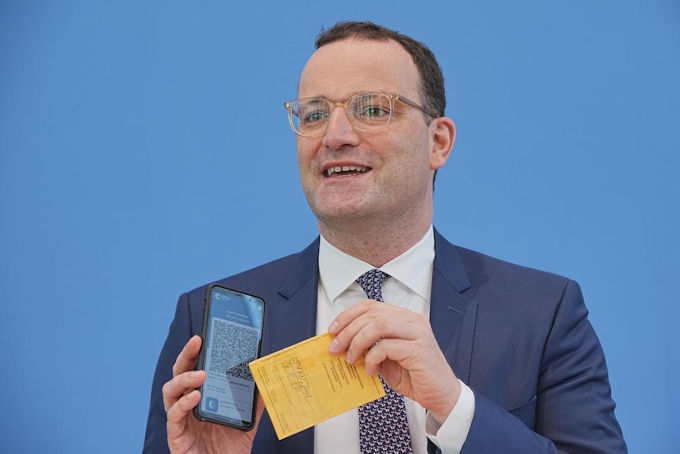
Almost 56 million Germans have had one dose of the vaccine, over 67% of the population, while 52.5 million, 63%, are fully vaccinated. Vaccines available to all citizens over 12 since early in the summer.
German health authorities have decided on Wednesday that starting on November 1, the unvaccinated will not receive compensation for lost pay if coronavirus measures forced them to quarantine.
Critics have said such rules would be equivalent to making COVID vaccinations mandatory, as many workers cannot afford to stay at home without pay.
Free rapid coronavirus tests for every citizen will no longer be available in Germany. Only those who cannot be vaccinated for medical reasons will have access to free tests. Everyone else who has no symptoms will have to pay for them.
The Vaccine Passports, under the "3G rule" apply nationwide in Germany, meaning that certain public spaces are only accessible to those who are vaccinated, recovered, or tested.
Up until now, those who are unvaccinated have been able to enjoy most of the same freedoms of those who have so-called Vaccine Passports, simply by allowing themselves to be tested for free.
There is also an optional 2G rule, allowing businesses to essentially bar anyone who is not vaccinated or recovered, using the Vaccine Passports.
Until now, Germany had used the average number of cases per 100,000 people across a seven-day period. Now that free testing is being abandoned, that measure is unreliable. Soon, the number of people admitted to hospital per 100,000 people per week is set to become the new benchmark.
United Kingdom
Population 68.1 million. Covid-19 deaths 136,375. Deaths per/mil 1,996
Many have criticised British Prime Minister Boris Johnson over his recent handling of the virus, including the UK's Labour Party, which branded the government "shambolic". Professor Neil Ferguson - a member of the Scientific Advisory Group for Emergencies (SAGE) - told MPs that levels of transmission in the UK are currently far higher than in other countries. Prof Ferguson said: "We are starting with quite a high incidence and so we don't have very much headroom for increases."
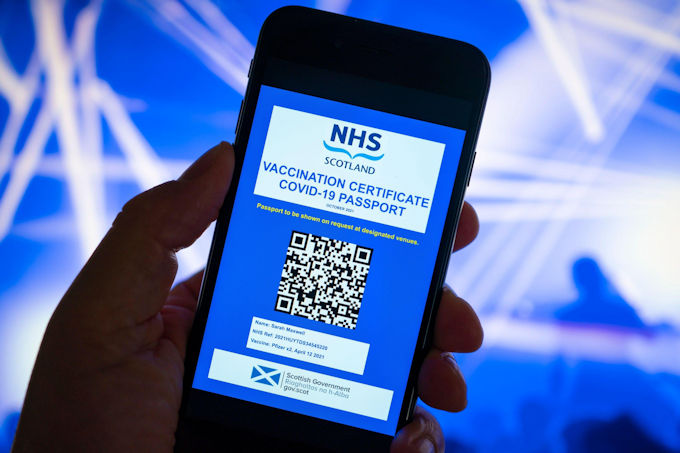
The UK government has announced it is unlikely the country will ever return to lockdown despite rising cases in the country. It also dropped a plan to make people in England show vaccine passports to enter crowded events such as nightclubs, the health minister said, claiming he "never liked the idea". There was also opposition from businesses in the sector and from some Conservative MPs.
Note that the Scottish Parliament made a different decision.
One of the big events taking place for the first time since the start of the pandemic is the London Marathon. More than 40,000 people ran the 26.2-mile (42.16km) course around London, from Greenwich to the Mall.
Figures show that 30,439 people tested positive for the virus in the last 24 hours. The seven day figure is 242,005, a 1.1% rise on the week before. Total deaths across the last week have dropped to 785, a fall of 180.
Scientists in the UK have warned that the country may still have worse to come during the pandemic, as winter approaches. They fear that more people will begin socialising inside as the weather gets colder, which increases the chance of transmitting the virus.
At present, about 600 people are being admitted to hospital with COVID-19 every day. He believes the NHS may struggle to cope if this doubles to 1,200 in the winter months.
Sweden
Population 10.2 million. Covid-19 deaths 14,808. Deaths per/mil 1,455
Sweden continues to stand out on COVID-19 strategy
The country has always charted its own, distinctive course when it comes to tackling the pandemic, and now Sweden is lifting all coronavirus restrictions.
The Swedes have developed their own, distinctive model of responding to the COVID-19 pandemic, based on the model of the responsible citizen. It wasn't politicians who decided what to do about the insidious disease. They left that to the scientists.
The scientists, in turn, mostly gave advice via the media on how citizens should behave: washing their hands, keeping their distance and staying at home. But it was up to the Swedes to follow the recommendations which weren't mandatory.
There were no lockdowns or steep fines for violations, as in other countries, since that just didn't fit the Swedish model of leaving it to citizens to take responsibility for themselves.
But, the strategy had fatal consequences, as it turned out later. (See the previous article dated 31 March.) Despite the comparatively high number of deaths, most Swedes are quite happy with their national strategy against COVID-19 and continue to trust the state. They point out that the pandemic has caused much less damage to Sweden's economy than elsewhere and that schools and kindergartens remained open throughout.
Did Sweden take the right path in handling the pandemic?
(12 minutes)
Published by: DW News - 1 Oct 2021
 Video URL: https://youtu.be/xUTZGyX145I
Video URL: https://youtu.be/xUTZGyX145I
With most adults vaccinated, Sweden is removing almost all pandemic restrictions Wednesday despite rising case numbers. The country has been an outlier in aspects of its handling of the disease, shunning hard lockdowns throughout the pandemic.
In recent months, anyone who wanted to be vaccinated could do so easily. Those who still held out and didn't get the shot are considered responsible for their own fate. The experts justify this pointing to the high vaccination rate, especially among the older population, are now lifting almost all coronavirus restrictions.
Canada
Population 38 million. Covid-19 deaths 27,754. Deaths per/mil 727
Canada was initially something of an outlier this past summer when it allowed people to mix and match vaccine doses, and research on the immune response to that approach has been positive.
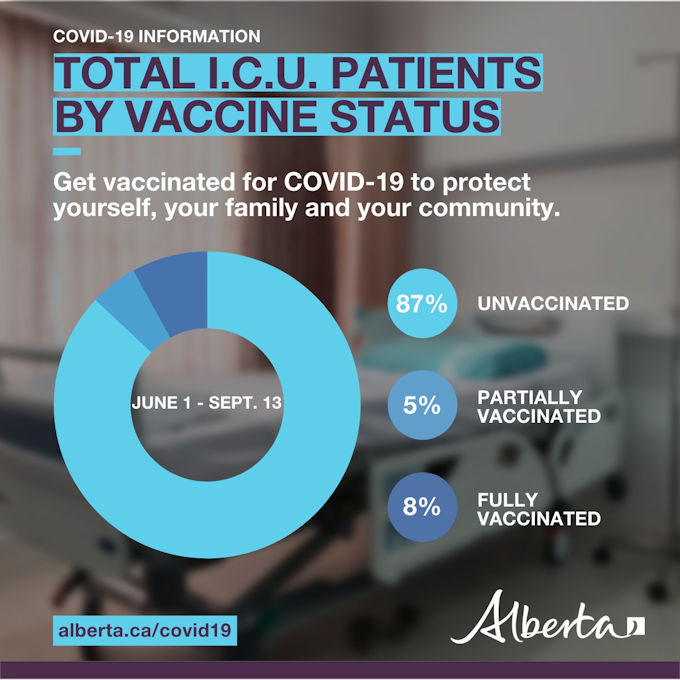
Those who followed public health directions and got the first dose available to them are likely to become frustrated at not being able to travel once mandatory vaccine doses are required to travel around the world.
Each province has it's own health system. At the end of September, 88.2 per cent of those 12 and older in the province of British Columbia have received their first dose of a COVID-19 vaccine and 81.6 per cent a second dose.
In the last week of September, people who were not fully vaccinated, accounted for 71.5 per cent of cases and, they accounted for 81.4 per cent of hospitalizations. After factoring for age, people not vaccinated are 25 times more likely to be hospitalized than those who are fully vaccinated.
China
Population 1440 million. Covid-19 deaths 4,636. Deaths per/mil 67
Mainland China has confirmed 96,258 COVID-19 cases, with the death toll unchanged at 4,636.
This number is so low, the statistic has to be questioned.
A brand new, 5000-room quarantine facility set to open in days has revealed China's obsession with reaching Covid-zero. The Guangzhou International Health Station, located in southern China, has been constructed over the course of just three months, at a cost of US$260 million ($377 million).
The purpose of the massive facility is to house incoming travellers – whether they be returning Chinese citizens or visitors from overseas – in a bid to stop the spread of the virus. When the first travellers destined for the facility touch down, they will be transported from the airport by bus. They must remain in their rooms for at least a fortnight.
Denmark
Population 5.8 million. Covid-19 deaths 2,652. Deaths per/mil 456
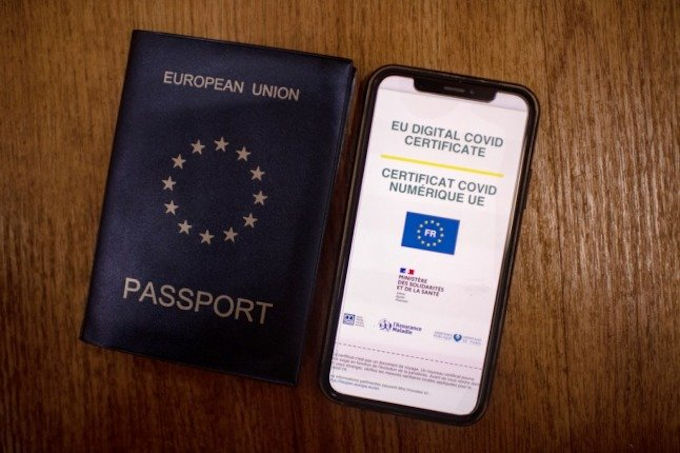
Denmark is now opening up post-Covid and most of its population is vaccinated. This enviable milestone was reached through a vaccination program which began in December last year. More than 4.3 million Danes over the age of 12 have been double vaccinated, which is 83.5 per cent of its eligible population, and 96 percent of those 65 and older.
Denmark has just dropped the last of its domestic pandemic restrictions, becoming the first European country to do so. “Daily life is basically back to normal but that does not mean there won't be any danger down the road,” Danish health minister Magnus Heunicke said on Friday.
Denmark introduced COVID-19 Passports in March 2021 as part of a gradual easing of rules.
On August 1, it lifted the COVID Passport requirement at museums and indoor events with fewer than 500 people, before ditching it for major events, while masks have not been required on public transport since mid-August.
On Saturday, a sold-out concert in the capital, Copenhagen, will welcome 50,000 people, a first in Europe. Danish authorities insist the virus is under control, with about 500 daily cases and a reproduction rate of 0.7.
Crucially, the Danes had the “highest level of optimism” and “lowest levels of concern” of eight countries including the UK surveyed in the Hope Project, a global initiative led by Danish universities. Andreas Roepstorff, an anthropology professor at Aarhus University in Denmark, said: that a successful vaccine roll out was less about the jab itself and more about “trusting the health authorities behind it”.
On 10 September, the Danish government announced that Covid-19 was no longer a “critical threat to society” and lifted all restrictions.
Taiwan
Population 23.8 million. Covid-19 deaths 842. Deaths per/mil 35
Taiwan is a very special case. Excluded from membership of the WHO by China, they understood that they had to rely on themselves. They locked down very early.
On 23 August, Taiwanese President Tsai Ing-wen became the first world leader to receive a brand-new vaccine conceived and made in Taiwan — Medigen Vaccine Biologics Corporation’s MVC-COV1901, which has yet to complete phase three trials. This marks the latest and most controversial stage in Taiwan’s robust response to the sudden COVID-19 surge it experienced in May.
Taiwan was remarkably effective in stopping the spread of COVID-19 in 2020, mobilising its Central Epidemic Command Centre as early as 20 January 2020. Taiwan immediately accelerated the production of tests, masks and respirators, closed its borders and launched efficient contact-tracing with coordinated information sharing. Schools and restaurants remained open.
Taiwan initially maintained control. By 30 April 2021, it had experienced a total of 1128 cases and 12 deaths over 16 months. But in May, the dam burst. Cases reached 8511 by the end of May (with 600 new cases per day at the end of that month) and 14,804 by end of June. Deaths reached 730 by 9 July.
Early and effective measures have shielded Taiwan from the worst of the pandemic, but Taiwan’s readiness had weakened, due to complacency over time and delay in rolling out vaccines. Only 41 per cent of the public was willing to take vaccines in April, given Taiwan’s full control of the pandemic up to that time.
A handful of China Airlines pilots were later found to have contracted the virus. From there, it spread through Taiwan’s adult entertainment ‘tea houses’ and eventually to local communities in mid-May.
Taiwan managed to defeat this sudden wave mostly through refocusing on its core methods and continued high levels of social cohesion.
Citizens will be given $246 worth of cash-equivalent coupons which can be spent in most shops, in an effort to boost the economy.
COVID comes to Taiwan: Two words kill BioNTech deal
(5 minutes)
Published by: DW News - 29 May 2021
 Video URL: https://youtu.be/uX0BImdWwBs
Video URL: https://youtu.be/uX0BImdWwBs
After more than a year of relative safety, Taiwan is battling its first major domestic outbreak, reporting hundreds of local cases daily. It's believed that airline pilots brought the U.K. variant to the island last month after quarantine was shortened to just 3 days for crew members.
Vaccine strategy is proving divisive among the Taiwanese public. Although the Medigen vaccine (MVC-COV1901) approval was based on positive responsiveness measured by early antibody counts, it will take more time to ascertain its actual efficacy. Its rapid deployment is becoming a highly political issue, and the opposition doubts its effectiveness and safety. Only 54 per cent of Taiwanese people are willing to take it. The controversy around slow vaccine deployment is now affecting support for the Democratic Progressive Party government.
Two lessons emerge from Taiwan’s recent experience with COVID-19 — even the best measures get eroded over time by complacency and fatigue, and it is nearly impossible to be safe from COVID-19 without adequate vaccine deployment.
Norway
Population 5.5 million. Covid-19 deaths 851. Deaths per/mil 155
Norway has re-opened society, ending its COVID-19 restrictions that have limited social interaction and hobbled many businesses.
As many as 76 per cent of Norwegian's have received their first dose of a COVID-19 vaccine. Meanwhile, 67 per cent have been fully immunized against the virus.
"It is 561 days since we introduced the toughest measures in Norway in peacetime … Now the time has come to return to a normal daily life," Prime Minister Erna Solberg told a news conference. "In short, we can now live as normal."
"Even though everyday life is now back to normal for most people, the pandemic is not over. People will still get sick and therefore it is important that everyone gets vaccinated," she added.
Australia
Population 25.7 million. Covid-19 deaths 1,278. Deaths per/mil 49
In the states of New South Wales and to a lesser extent Victoria, Covid-19 Delta Variant is at large despite attempts to maintain a lock-down.
Australia has begun to shift strategies from eliminating COVID-19 to living with it once over 70% of the population is vaccinated, a goal it believes is attainable by November.
Victoria and NSW COVID-19 updates, Abbott's Taiwan call
(9 minutes)
Published by: 9 News Australia - 8 Oct 2021
 Video URL: https://youtu.be/w60uX0dIuT4
Video URL: https://youtu.be/w60uX0dIuT4
In the eastern state of New South Wales, the epicenter of the country’s largest COVID-19 outbreak, 75% of people over the age of 16 have had at least one dose of the vaccine and in neighbouring Victoria, 62% of those over the age of 16 have had at least one dose.
Singapore
Population 5.9 million. Covid-19 deaths 85. Deaths per/mil 14
Singapore's Ministry of Health reported 2,909 new Covid-19 cases on Friday. There are 1,356 cases warded in hospitals, 222 cases that require oxygen supplementation, and 34 cases in the intensive care unit as of Friday, according to the ministry.
The ministry also reported that among the 31,057 infected individuals over the past 28 days, 98.2% had no or mild symptoms, thanks to country's high vaccination rate.
As of Thursday, 82% of the Singapore population has received two doses of the Covid-19 vaccine, and 85% has received at least one dose -- one of the highest vaccination rates in the world.
With the spreading of highly contagious Delta variant, the government has decided to reimpose tighter restrictions include limiting social gatherings to two people, making work-from-home the standard again, rather than having 50% of employees in the office, and suspending or moving classes online for students aged 12 and under.
New Zealand
Population 5 million. Covid-19 deaths 27. Deaths per/mil 5
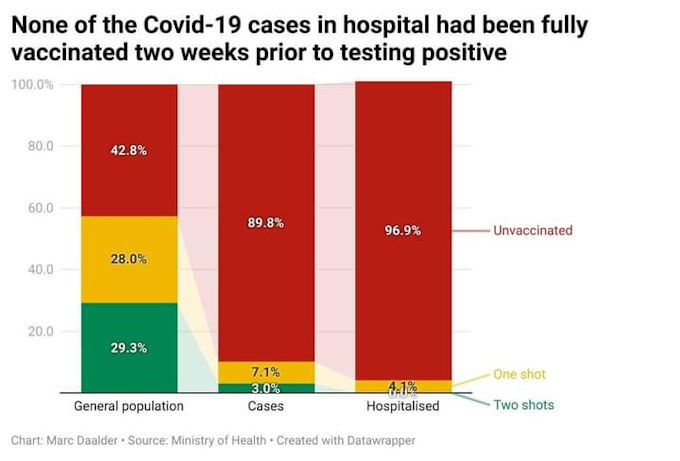
Currently New Zealand has a persistent community outbreak in Auckland. Three weeks ago it seemed to be almost over with a strong lock down in place. The lock down was made slightly less restrictive, and suddenly there were new cases, and worryingly new cases that are not obviously linked to existing clusters.
The strategy to eliminate the virus remains, the objective. However, the facts on the ground may force a different objective soon.
Meanwhile the task of getting 90% of the population over 5 years of age vaccinated has been proposed.
A “short and sharp” lockdown was introduced in mid-August to counter rising cases, but 32 new cases were confirmed in the country’s largest city on Sunday, with two new cases in the Waikato region 147km (91 miles) south of Auckland.
Taiwan vs New Zealand: Whose pandemic strategy is best?
(12 minutes)
Published by: DW News - 14 July 2021
 Video URL: https://youtu.be/BuB6JhiNiHs
Video URL: https://youtu.be/BuB6JhiNiHs
Strict lockdowns save lives. That's New Zealand's philosophy for dealing with Covid-19. Taiwan avoided them. It preferred tests, quarantines and masks to contain the virus's spread.
Initially, both islands enjoyed success. But that changed for Taiwan, which was recently hit by the alpha variant. It hit hard, despite the government's expertise in dealing with outbreaks of other diseases, like SARS. What happened? And is one government's approach better?
It is proposed to introduce a Vaccination Certificate in November. People are advised to get their first dose now, because it takes seven or eight weeks to develop immunity, and people won't be issued with a certificate until at least 14 days after their second dose. The message is; "Get ready for Christmas"